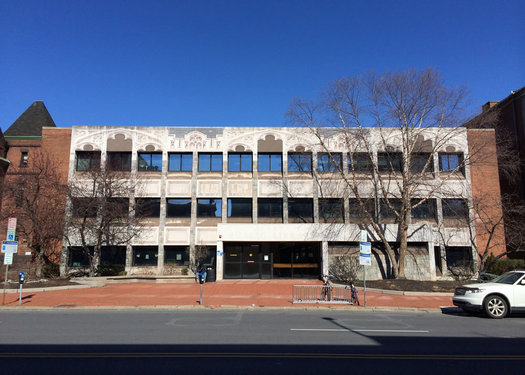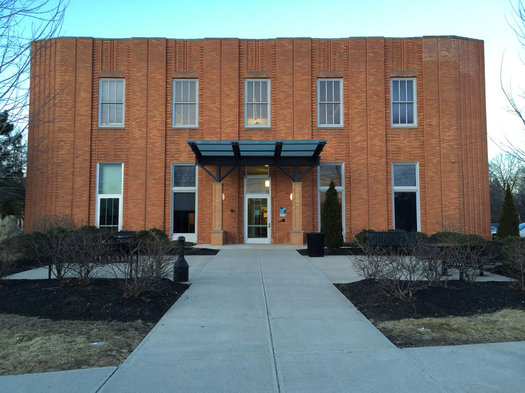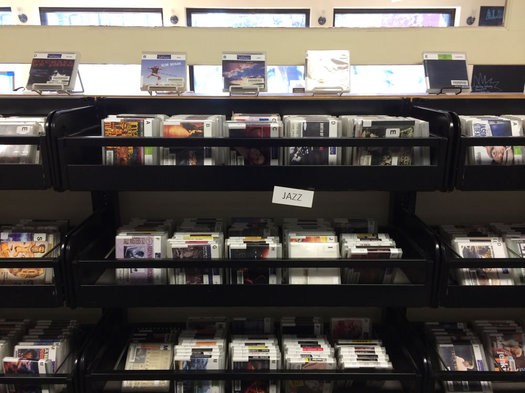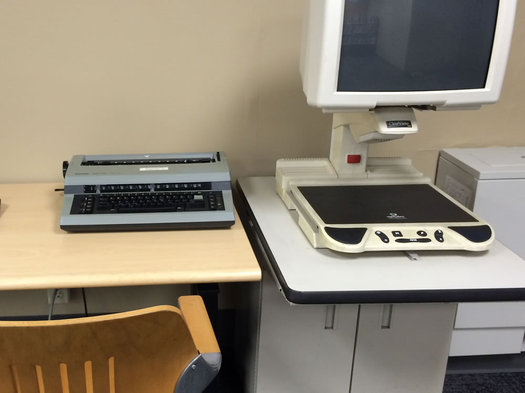Libraries are about books. And the internet. And technological change. And community.

It's different things to different people.
We're always curious about people's jobs. And not just "What do you do?" -- but also "How do you do that?" and "What are the new things?" and "What surprises you about your job?" Stuff like that.
And it's especially true when it comes to jobs that might seem to be about one thing, but actually are about all sorts of things. (As it happens, that's most jobs.)
Like, when you think about libraries, you probably think of books. Because... obviously. But as we found during a recent chat with Albany Public Library executive director Scott Jarzombek, the internet is now a big part of modern public libraries.
So our conversation ended up being about all sorts of stuff -- about why people are waiting to get into libraries in the morning, ebooks versus old-school books, libraries as community hubs, the persistence of old media, and... the best books he's read recently.
The internet and digital media have prompted so much change in so many different businesses. The library isn't any different?
I got into libraries because of the internet. I started as a student employee of my university's library, and I worked in the computer lab because that was starting to be where they were getting a lot of interest. And when I went to library school someone told me, "Why are you going to library school, the internet's going to kill libraries." To which I kind of knew in the back of my mind that's not really true.
So when I finally started with the APL, I was a grant employee to set up a network and computer lab at the Howe branch of the Albany Public Library. In the time before the internet was up, we'd be lucky to see three or four people a day if we didn't have a program. Then we went to having tons of people every day once we got the internet up and running in that location.
So I really started my career, and really got attracted to libraries, because of the internet. And to me that's one of the major pieces of business that we do. If you drive past one of our locations in the morning you'll see people waiting for us to open our doors. They're not waiting for books. They're either waiting for our wi-fi or they're waiting to get inside to use one of our computers to get on the internet.
So the internet was a blessing for public libraries.
With these new patrons, with this new traffic -- both people and digital -- how does that change what the library is focused on or trying to do?
I would say we've taken on more. We're always going to be the number one place in the community to get a physical book. And if you look at the marketplace right now for ebooks, it's completely plateaued. The numbers of people buying e-readers is down, most people are using their [mobile] devices to read. Most people out there still want physical material. I'm a technology guy -- hate ebooks. I literally can't use ebooks for reading. I think there are a lot of people out there [like that].
While [ebook] usage in public libraries is growing, I think it's going to do the same as the market and plateau at some point and we won't see as much growth in that area. Ebooks are just another format. We're always going to need physical books.

The APL's Pine Hills location.
But we also have to change our spaces because the other thing that we do really well is programming. And on top of programming is being that "third place." You know, you walk around today at the Pine Hills branch and you'll see people who just come here to read our magazines, sometimes meet their neighbors, and other times it's just a place in the community that's not home and not work. We're really a kind of important third place.
So it's changing our spaces so that we can welcome those people who like technology, we can welcome the people who are here for our programs, the book borrowers who still come to us, but also providing that community space.
We see this in the media business where the idea of what is content is always changing. Back in the day "content" was an article. Now it can be everything from a tweet to a Facebook post to an article to a Snapchat video, whatever. What are some of the changes you're seeing -- and how do you adapt to that?
We're here to help people access information and get content. So for us, again there's that blessing in disguise, a really strong wi-fi connection and the ability to loan a tablet gives people a lot of access to information they might never have been able to access in the past. So for us we find the pathway and sometimes how do we provide that vehicle to get down to that information.
I don't read a newspaper in the morning. I don't have to pay for newspaper delivery in the morning because I wake up and the first thing I do to find out the news while I'm drinking my coffee is go on Twitter. And that's where I get the majority of my news. And for people who live in the city who either can't afford high data usage and also can't get an internet connection, their pathway is to come to the library, log in to their social media and get that content and read it while they're in the library because we provide that pathway.
In some ways it makes life a little easier for us because people are just using using us to get on the internet so they can get that information. But, you know, the old-school content is also still popular and still consumed by the public. So we have to pay for the connectivity but also have a robust periodical collection, get through paywalls for people, and provide those books -- and they're not cheap.
So it's an additional service that we're providing to the public on the same amount of money, on the same budget. That's where it gets really tricky.
What's an old-school type of media or content that you think is surprisingly still popular?
I gotta say newspapers. No offense to newspapers. I don't know if they're going to be out there in a few years, but they've lasted much longer than most people think.

CDs -- we have a really big CD collection and they're still going out. When I subscribed to Spotify, it was like all of my CDs disappeared. So CDs always really surprise me.
We haven't seen as much of a decline in DVDs as I predicted. In neighborhoods like Pine Hills where you might get more of a Netflix crowd, there's been a decrease. But overall people have still been borrowing DVDs from us like there's no tomorrow. It's amazing how many DVDs go out of our libraries every day.
Whenever there's a big shift in the media, people are always saying this is the thing that kills (x) -- and yet, a lot of times, those old things don't really get killed off, they just persist in different ways. You see that with radio and film and other things.
I think the death of formats is more the death of the commercial viability of the format. When I was young, even into adulthood, I played in bands and I didn't care if my band was releasing a CD. What I cared about was whether there was a record label that wanted to do a 7-inch, wanted to do a vinyl record of whatever we had out. The CDs would come out and I wasn't excited about that. I wanted that LP version of our music. I have friends that have record labels and sometimes make a lot of money selling LPs of a recording that you can get on CD, but everybody wants that LP, they want the big artwork.
So I think most formats stay around. There's a movement to release things on cassette now. So those formats stay around, they're just not what Best Buy is going to make a ton of money off of. So to major media outlets it's dead. But the reality is that it's still there -- it's just not being sold at Walmart anymore.
I'm totally waiting for hipster kids in 2025 to be all in to microfiche again.
We still have microfiche! And people still use it!
At [the] Washington Avenue [location] there's a really great example: I think libraries don't just bridge the digital divide, we also help people transition at a much slower pace than they normally would have to. So at Washington Avenue in one corner of the public space of the building there's a typewriter. And when I wanted to get rid of that typewriter, my staff were like, "No, it's still used."

So in one corner you have microfiche and a typewriter and then you go across to the other side of the building and you have a 3-D printer. And I think that's a great indicator of what public libraries do. We keep the old so people can transition at their own pace -- or never transition at all -- but at the same time we're still introducing that disruptive technology to people. So we do old school and new school, which I love.
In 10 or 20 years from now, what do you think is going to be the thing that people say [about libraries], oh my gosh, I can't believe we did that then?
I really don't know if there's anything... maybe not being open 24/7. If I had a magic wand and one Powerball that's what I would do. Not adopting to solar quicker...
Yeah, a 24-hour building, which I think at some point is coming in the library's future. I think it's necessary, or at least buildings that are open until 12 o'clock at night. Because that's the direction our society's going. Some people work that third shift and they can't use the public library because of that. So I think at some point we'll be available all the time to everybody.
But libraries adopt and change so much that I don't think we'll fall behind in what we do.
What's the biggest challenge?
Financial. Money. For a city our size, it's amazing to have seven branches. And when you have seven locations you need the staff to run them, and people aren't cheap. Maybe someday there will be single-payer healthcare which will make my life a lot easier, will make a lot of people's lives easier. I think people don't realize when you see a person's salary, take half of that and add it on -- and there you go with healthcare.
So I could have a lot more staff if there was single payer healthcare that we didn't have to pay into healthcare. That's the biggest challenge, just financial. Getting enough staff, enough qualified staff, to do the programming, to do the research for people.
I think people are under the misconception that you can run a library with volunteers. That worked 30-40 years ago when you just came in a library to borrow a book. These are well-trained professionals that are constantly going and continuing their education, who need to learn how to deal with customers with mental illness, to doing research on health, have great skills with dealing with children and promoting early literacy and digital literacy. And everyone has to be a little bit of a computer expert. So these are the minimal expectations you have when people walk in the doors. And you don't get that from volunteers, and you don't get that from underpaid staff.
That's our biggest challenge, the finances, and having enough money to be open the hours that people want us to be, with the staff who are qualified to run the buildings.
You said you're still an old-school book reader. What's the best book you've read in the past year?
Dictator by [Robert] Harris. It's about the Roman Empire. It's about Caesar's rise to power. I'm a big history person, but I'm not a big fiction history person, and that book blew me away.
Leviathan Wakes [by James S.A. Corey]. It's [the TV show] The Expanse. Oh my god, I would pick that book up on multiple occasions and I'm like a 12 year old, I go, "Too big, I can't read this." And finally I had a friend who was like you have to read it -- it's everything you love. It's a little bit of sci-fi PI, which I'm a total sucker for. And also a little bit of space opera, which I'm a total sucker for.
That book... I did 400 pages in a night, which is bizarre for me. But I could not put the book down.
This interview was edited and condensed.
____
Earlier on AOA: A photo tour of Albany's new libraries (2011)
The APL advertises on AOA.
Say Something!
We'd really like you to take part in the conversation here at All Over Albany. But we do have a few rules here. Don't worry, they're easy. The first: be kind. The second: treat everyone else with the same respect you'd like to see in return. Cool? Great, post away. Comments are moderated so it might take a little while for your comment to show up. Thanks for being patient.
Comments
scott j for president
but for real. i love this man
...party at scotts
... said greg k on Mar 9, 2016 at 6:06 PM | link
I love this so much. I am a huge consumer of the library and have been since my working mom made us go the the library every Tuesday after school to do homework. The children's librarian was named Mary Ferris (how could I forget her?!) and couldn't have been more suited to the job. She counteracted the crab who worked upstairs (nicknamed "Old Lady Mothballs") who was silly enough to phone my mother and tattle to her that I was reading "The Thorn Birds" while I was in middle school. (my very modern mother said "and...?")
We *are* very lucky to have 7 branches of our library and that Scott is so forward thinking and I'm sure is part of the trend away from the Old Lady Mothballs librarians of the world. The Pine Hills library is "my" branch and typically very busy with computer users and LOTS of kids doing homework or making social noise without being shushed. It's pretty great.
... said Rebecca on Mar 9, 2016 at 7:31 PM | link
Yay libraries!!
... said Leah on Mar 9, 2016 at 8:57 PM | link
Scott J is no bystander to the library scene. I love that he's using data on APL use and is shaping it to people's needs here. We had a chat about this recently, and both internet and space usage for events/programs seemed to be the highest priority. Community, indeed!
... said James at 46 or so on Mar 10, 2016 at 8:13 AM | link
Wonderful interview!
Really liked this: "And I think that's a great indicator of what public libraries do. We keep the old so people can transition at their own pace -- or never transition at all -- but at the same time we're still introducing that disruptive technology to people."
... said ethan on Mar 10, 2016 at 9:35 AM | link
space opera......
... said J. Welf on Mar 10, 2016 at 9:55 AM | link
I love going to the library! I frequently sign out books and DVD's and love that I can request items from other libraries and get notified by email when they are ready for pick-up.
... said Susan on Mar 10, 2016 at 10:05 AM | link
Love our neighborhood libraries and love what this guy is doing to keep them fresh, diverse in scope, and modernized. Also appreciate that they've staggered the open/closing hours across the branches, so that there is always an option on my commute home.
... said Rich on Mar 10, 2016 at 11:29 AM | link
Just stopped in at the Albany Main branch today - the staff that works there is stellar. With Scott at the helm I see great thing in the APL's future.
... said Kate on Mar 10, 2016 at 12:49 PM | link
I love that he acknowledges that libraries are still in a large way all about materials and collections. APLs have really community-driven collections, and I think that is really important to people. Programming and community are the "new librarianship", but APL is in great shape having not thrown the baby out with the bathwater (still maintaining strong collections of physical materials). I love the app as well. I am a library super-user mostly because the app is so convenient.
... said lucy on Mar 11, 2016 at 8:52 AM | link
Scott's passion for the library and respect for the people he and his staff serves is admirable and this comes through in this interview. He's a great guy and btw to the comment above, Mary Ferris just recently retired. She is top notch!
... said Renee on Mar 11, 2016 at 9:16 PM | link